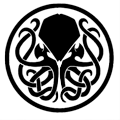 Keeper Note: A fair bit has happened in the world since the events on the Forgotten Isle. Most significant was the shock German invasion of the Soviet Union on June 22nd.
Keeper Note: A fair bit has happened in the world since the events on the Forgotten Isle. Most significant was the shock German invasion of the Soviet Union on June 22nd.Back in the USSR |
Playlist: Back in the USSR - The Beatles |
 Keeper Note: A fair bit has happened in the world since the events on the Forgotten Isle. Most significant was the shock German invasion of the Soviet Union on June 22nd. Keeper Note: A fair bit has happened in the world since the events on the Forgotten Isle. Most significant was the shock German invasion of the Soviet Union on June 22nd. |
Once more, the team found themselves in the comfortable chairs in Alec, Viscount Towton's briefing room.
Having greeted them warmly, and asked after details such as Cyril's surgery to remove the bullets left after Glemt Øe, Alec got down to business.
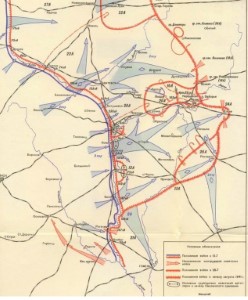 |
"Hitler's invasion of the USSR has caught a lot of people on the hop," he said. "They've blitzed forwards so fast, they caught a whole army in a pocket near Smolensk. Three hundred thousand men, two thousand tanks, nearly as many guns, all captured. Bad business. But what interests us is some of the reports from survivors who escaped."
"Some of these survivors described whole companies of captured soldiers simply disappearing; they never showed up on prisoner lists. A few," he leaned forward intently, "have reported finding Soviet corpses partially eaten. And some claim that other Soviet soldiers were doing the eating."
He leaned back. "Naturally, the Soviets have hushed all that up. Actually, they've hushed the whole Pocket debacle up as much as they can; they're like that. But they've also come to us with it."
"The Soviets have two agencies in roughly the same line of work as Section M; Institute 21 of the NKVD, and Otdel MI, the Bureau of Extraplanar Research. While Institute 21 are very insular and uncooperative, Otdel MI have been in contact with the allies for some time, and are willing to work together. This investigation has fallen to them, though the rivalries between the two agencies may result in some overlap and friction."
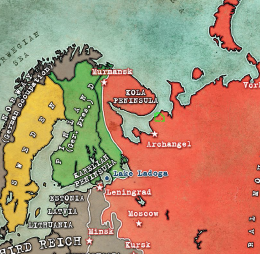 |
A week or so ago, the Soviets stumbled on a secret base the Krauts had somehow set up on their own coastline, just north of Archangel and Murmansk. A scientific team, supported by a military escort, had gone in, taken it over and started investigating. What they found made them call for help.
While they had some serious brains and occultists in their ranks, Otdel MI did not yet have experienced field teams, and they had approached Section M to ask if they can borrow one. As Alec looked at them, it was clear who had been assigned to this one!
Operation Lend-Lease - the shipping of resource and weapons to Europe and her allies by the US - was in operation, and convoys were running to Murmansk. Convoy Dervish was due to leave on November 20th for Murmansk. Unbeknownst to most of those travelling with it, a British Undine-class submarine would be travelling with it as transport for the team, to veer off near Murmansk and reach Intsy around December 5th.
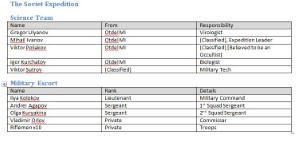 |
They were to meet their Soviet counterparts at Intsy and assist them in investigating their discoveries. If these led to other lines of investigation, the team were directed to provide assistance as requested.
Needless to say, the political implications of this co-operation, despite their secrecy, were considerable. A co-operative effort delivering successes would be very good for the Allied-Soviet relationship. Failure or dissent between the two teams would be bad. The whole feel of this was that it was a bit of a milk run, teaching what they’d learned to agents of a friendly power and doing some research. A PR exercise, but a very important one.
"The usual orientation training and spin-up will begin tomorrow," said Alec, and grinned. "Pack a sweater."
The next morning, their 30 days of training and orientation began. A variety of options existed, and training was provided to different people in different things, including Russian Folklore or History, Forensics, understanding of the Soviet Communist Party and its workings (Anné took rather alarmingly well to these teachings!), navigation, photography, radio operations, skiing and Arctic survival. Deadman also offered to teach some of his less dangerous magic where it was wanted, something Marcus took up, learning the Elder Sign.
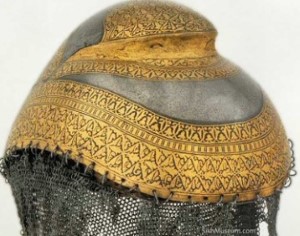 |
Equipment was issued, the best in cold-weather clothing that the Allies could produce. Ammunition was replaced, with the exception of that for the special Black Sun Mausers, and Anné's elephant gun. .470 ammo wasn't being made, all the factories were shifted to .303 rifle ammo. Birapeer and Anné shared out what they had left.
Birapeer had seen the benefit of Joe's steel helmet in the battle at Glemt Øe, and had arranged for his country's ancient turban helmet to be reproduced - sans the mail aventail. Once wrapped in his turban, it would be unobtrusive but protective.
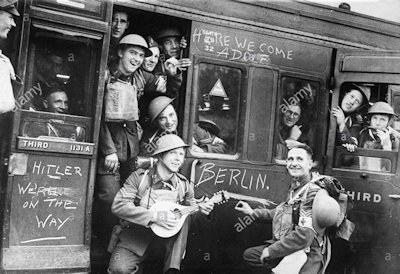 |
Once again, the team found themselves on a train, this time a packed troop transport heading to Liverpool to transfer men to ships heading to Greece and Africa. Some of the soldiers were rowdy, some were very quiet and some were clearly holding in their fear. All looked very young, somehow.
Eventually the train reached Liverpool and the soldiers were marched to the docks. Following the ranks, the team found men being admitted a Company at a time. When the team came to the front, the guards blinked at them in surprise, but after dubiously peering at their movement orders, directed them to a section of the docks where a couple of submarines were docked. The dock they were directed to, 94, held one of the smaller subs, which had HMS Undine painted on the side.
Two ratings stood at the foot of the gangway, eyeing the unlikely-looking group as they approached. No-one volunteered anything, so one of the sailors coughed and said, "Excuse me, are you lost?" Birapeer couldn't resist this. Thickening his accent as he did when playing the "Indian Chap", he said "I was looking for India!"
 Keeper Note: Normally a boat is the smaller size, and a serious vessel is a ship. For some reason,. submarines are always a boat. Keeper Note: Normally a boat is the smaller size, and a serious vessel is a ship. For some reason,. submarines are always a boat. |
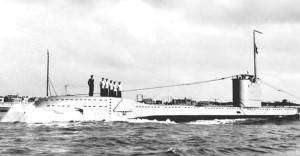 |
The sailor chuckled, and hooked a thumb over his shoulder in a creditable easterly direction. "It's that way, mate," he said cheerfully, "but you can't stay here. This is a Naval dockyard." Joe, who'd been distracted looking at the submarine, shook his head slightly and handed his movement orders forward. The sailor scanned them and became immediately more respectful. "Ah, oh, sorry Sirs and Madams, please follow me?" In single file they walked onto the boat, climbed to the top of the tower and started down the ladder into the hatch. "Nice," said Birapeer to the snotty; "where's the cockpit?" The lad blushed. "That's the conning tower, sir," he said, pointing at the superstructure. Birapeer frowned. No windscreen?
Inside the tower, the group were introduced to a young Naval officer with a Lieutenant's stripes. This was Troy Brabant, commander of the Undine, and referred to as Captain by his crew. He at least was expecting them. Greeting them with warm handshakes as they passed - not all would by any means fit into the tower - he directed them to the forward torpedo room, where one tin-fish had been removed to allow stowage space for the team's gear.
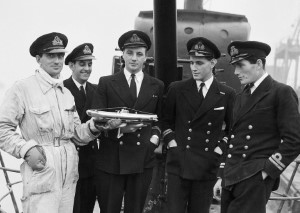 |
Over the next month, they were to come to know the officers and crew quite well. The command crew, again all painfully young, were (R-L):
 Keeper Note: Keeper Note: Convoy Dervish, November 21st 1941. The Convoy Commodore was Captain J. C. K. Dowding RNR in Llanstephan Castle. Also on board are most of the 2,700 men of 151 Wing Royal Air Force (RAF), including fourteen pilots and civilians including Vernon Bartlett MP, the US newspaper reporter Wallace Carrol, Feliks Topolski, the Polish expressionist painter and official British and Polish war artist, a Polish legation, a Czechoslovak commission and Charlotte Haldane, a noted feminist and member of the Communist Party of Great Britain, who lectures on Domestic life in Russia as part of an impromptu course laid on by the civilian passengers. |
The enlisted men, normally twenty-five but cut down to eighteen to make space, were a wiry, hardy lot, dressed like the officers in simple greasy overalls. Initially, their "passengers" attracted rather unfriendly stares, and Brabant quietly explaind that this was due to the "luxury" of being passengers and carrying more than the single square foot of personal storage crew and officers were allocated. The Captain made some suggestions as to how to ease this over the next few weeks.
Brabant gave them each a set of overalls, and strongly recommended them to step ashore and change now.
A few hours later, the boat put to sea, remaining surfaced until the convoy sailed, at which point she dived.
She remained dived for the days of the trip, usually at snorkel depth. The submarine’s “day” was at night, when she surfaced for the night just out of detection range of the convoy so the crew could get some cherished fresh air while the diesels recharged the batteries. Only then could the stove be run, so that’s when the day’s single meal was provided.
Each night, the air outside was colder.
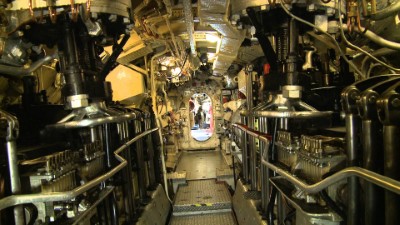 |
Life in a submarine is unpleasant. Immensely cramped, there is no privacy, but no-one undresses, shaves or washes in any case, because there isn’t room and there isn’t the water. After a couple of hours down below, the air gets stale, hot and sticky. “Lubbers” – especially tall ones! - are constantly banging their heads on low pipes and shins on “legbreaker” hatches.
A lot of off-duty time is spent sleeping, which is in fact encouraged, to save precious oxygen, for when a chap is asleep he uses less than if he were awake. Hammocks and bunks are crammed in everywhere, among the engines, in the wardroom, among the torpedoes.
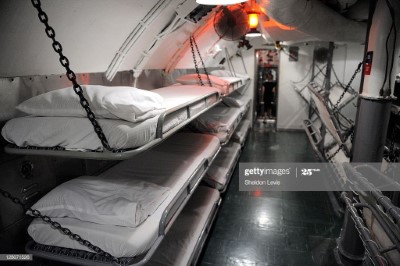 |
Off watch, pastimes are many and varied, cards, chess and ludo are the favourites, but some fellows make things with pen knives and pieces of wood, others prefer metal-work. Then of course there is always an argument going on for anyone to join in, not heated but just enough to cause interest and pass the time.
Following Brabant's hint, the team rolled up their sleeves and went to work, picking up jobs they could help with to ease the extra work the crew had with seven men missing. Francoise's exhaustive knowledge of aero engines made her an asset in the engine room, while - with a little aid from a hammer - Birapeer managed to ease a constantly sticking hatch. Joe, less affected by the close quarters than anyone, fitted in well, but Jimmy developed mild claustrophobia and when assigned a shift on the radio apparatus managed to lose an entire shift's signals and was banished to his bunk. Anné also proved deft with the boat's systems, choosing not to tell the crew that it was her sabotage experience that made her so, rather than anything more positive.
On December 3rd, the convoy turned down the inlet towards Murmansk, and the Undine peeled off northwards towards the White Sea. It was another 580 miles to Intsy, and this took a further 2 days – all underwater. Intelligence signals had warned that a U-Boat pack was prowling the waters off Murmansk and Brabant didn’t want to be caught on the surface; “Sad to say, they’re better than ours,” he said, then patted the hull. “Sorry, old gel!”
Finally, at dusk, the sub sighted the base, visible only as a small dock overhung by a large crag which concealed it from the land.
Pre-arranged coded radio messages were sent, but no reply was received. Cohen was not in the least troubled by this; “Russki wireless has a really bad reputation,” he said dismissively. “Probably broken down.” Brabant nodded, and directed the helmsman to surface and take the sub up to the dock.
It was now bloody cold; between -2 and -5 degrees in the day, much colder at night.
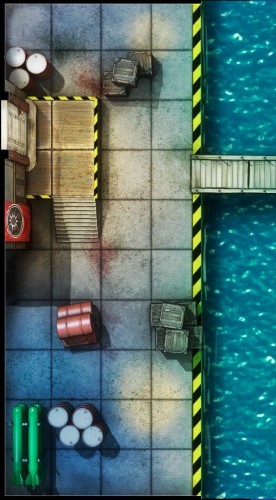 |
Finally the boat snubbed up to the dock. Brabant was really nervous now; he didn’t want to spend any more time surfaced and stationary than he had to, and he urged the team to disembark pronto. Cautiously, they hauled their gear onto the dock, and watched as the sub cast off and drifted away to sea.
Exploring the dock, they took cover behind the crates and drums as Joe explored the door itself. The crates, with the Reich eagle stamped on them and the drums both moved as if empty, though the drums smelled of diesel fuel. The torpedoes were standard Kriegsmarine models used on U-Boats.
A Voorish Sign revealed traces of magic and a taint of death beyond the door, though the thickness of the walls reduced this to just hints.
The door - a heavy metal weather door - was shut and appeared to be locked from the inside. Joe knocked, and hastilly dropped to the dock to cover anyone who emerged. Nothing happened, and he had to resory to a shoulder to get it open.
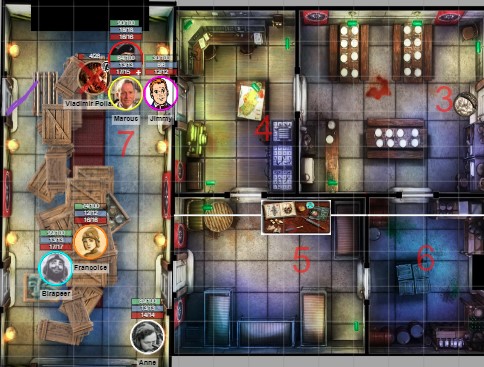 |
Despite having a very basic lock, the door was heavily padded and socketed to keep heat and light from escaping. Beyond lay only darkness, so torches were unpacked.
As the torches flashed into the darkened room, crazy shadows and reflections from the layer of ice over everything flickered and danced. It was roughly as cold inside as the outside, less wind chill. Nothing seemed to be moving, so Joe, Marcus and Francoise cautiously ventured in.
The air was still, and rather stale with a slight tang of disinfectant. The silence was oppressive and unnerving.
Three heavy wooden benches largely filled the room, with space for 25 people though only a dozen or so places look to have been set. A serving counter sat at one end, with a stove and store cupboard behind it. At the back were shelves for utensils and cleaning equipment. A military telephone is mounted on one wall, and electric light fittings on several - though when Francoise tried the switch, nothing happened.
Clearly visible on the wall to the right were two Black Sun banners; one of these had been shredded with a bladed weapon.
A large pool of dark reddish brown, frozen liquid lay between two of the tables, glinting ominously in the flashes of torchlight. Joe gestured Marcus forward; "You did the forensics training," he said, "is that blood?"
Very carefully, Marcus approached it, and peered at it cautiously. As he did so, he glanced under the nearest table, and nearly laughed. Reaching under, he drew out... a gravy boat. "It's not blood," he reported.
Francoise looked in the stove and found a meal, of a Russian type rather than German, loaded in but uncooked.
The south door was marked - in German - “Medical Stores” and the western one “Radio/Command Room”
The internal doors turned out to be simple swing doors with self-closing hinges, and not fastened. Joe led the way through into the next room to the south. It was packed with crates, boxes and bottles which indeed did contain medical stores, as well as diesel drums for some reason.
As the light fell into this room, sounds of movement came from the south-east corner, by the sound of it from several creatures. Peering under cupboards revealed a couple of rats, and the team wisely left them alone.
Four cots occupied this rather cheerless room, all unoccupied, and a desk and cabinet contained fairly perfunctory medical equipment. A record book, in German, charted basic ailments and minor injuries. Franoise took some time leafing through it, uncovering tooth extractions, broken bones, food poisoning and ‘loss of moral fibre’ along with the names of those treated. Against one of the LMF cases was the laconic notation “Shot.” These became more common as time went on.
The eastern door is marked “Medical Stores” and the western one “Corridor”
This room contained an assortment of electrical equipment, which turned out to be the base’s radio apparatus and a small internal telephone system to the north, and a distribution box for the power cabling to the south-east. None of it was operating.
Bullet pocks dotted the wall in several places.
Some sheets of paper in German (fairly mundane reports and weather data) lay on the radio desk, along with a sheet of notes in Russian, cross-reference for the German control labels.
In the centre of the room was a table with several maps on it. One showed the immediate area, down as far as the edge of Archangel at the end of the White Sea. Tiny settlements of one or two buildings are shown, each crossed through in red ink. The only other thing marked on the map was the Ard Griba Diamond Mine, against which were some pencilled notes in German: “Zu viele für die verfügbare Versorgung, mehr Rohstoff von der Front benötigt”. Birapeer pored over this but couldn't make sense of it.
Next to the western door was a bizarre piece of apparatus, a box with a panel a bit like an upright, pentagonal saucepan made of crystal on top. That and several other pieces of it glowed with a pale green illumination that was uncomfortable on the eyes, but wasn't similar to the Mi-Go equipment or the Nachtwölfe. It had no connections and no labels or instructions, and couldn't be opened, though Marcus tried quite hard. It weighed about the same as a man and could probably be carried.
The south door was marked “Infirmary” and the western one “Corridor”
This space was rather larger and crammed with crates, meaning that the torch only revealed a percentage of the total. Joe stepped in, with Marcus and Anné, who moved to her left down the room with her own torch. Bullet pocks were clearly visible in several of the walls, and dark stains on the floor looked worryingly like frozen blood (but then, so did the gravy). Joe held up a hand; he'd heard a shufflling sound, accopanied by a faint sound of moving air, like a very poor air-conditioning. They waited nervously, but nothing else happened for some time. Joe stepped forwards and right, angling his torch to try and see behind the crates.
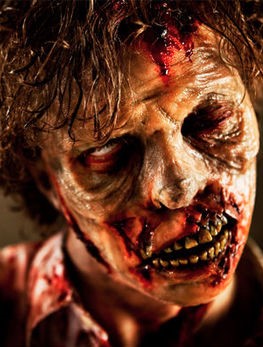 |
With terrifying suddenness and a deafening crashing of displaced crates, something humanoid scrambled up over the crates from behind and down towards the tanker. Only experience of the weird and wonderful gained over the last couple of years saved them. Joe whipped up his Bren and sent a burst straight into the thing. The bullets tore through the flesh, sending blood and gobbets of half-frozen meat splattering across the crates - and, apparently completely unaffected by this, it leaped at him, flailing an arm and biting.
Frantically he dodged and blocked with the gun. He avoided being clawed or bitten, though the impact as it reached him rocked him on his feet and he nearly went over. Marcus and Francoise, seeing that bullets were of little effect, drew blades and attacked.
 Keeper Note: Once again, I got no notes while this was going on - running a fight over Roll20 is harder work than it is at the table - so I may have misremembered some details. Keeper Note: Once again, I got no notes while this was going on - running a fight over Roll20 is harder work than it is at the table - so I may have misremembered some details. |
Marcus had chosen the Totenmesser, forged from the claws of Black Sun's Die Toten, and drove it home with relish. As it went in, he felt in some arcane way that he could reach out and harvest the dark energy propelling the reanimated corpse. Eagerly, he did, and his muscles spasmed as he felt energy, tainted and dark and horribly satisfying, flow into him. Agression flooded the fear out of his mind, and his lips drew back from his teeth as he recovered the blade for another strike. As he did, he noticed that the flesh of the creature was scorched and shrivelled where he had stabbed it.
Her line of sight blocked, Anné could do nothing but guard the other end of the corridor, glancing worriedly back as the fight unfolded.
Francoise and Joe snatched out their silver Phurba, hoping the blessed blades would be equally effective, but they seemed merely to cut them. None the less, they hacked away, and eventually, the three of them cut it down. Breathing hard, they stared down at it. It appeared to be the dead and half-frozen body of a man in his early thirties, quite decayed and with wounds all over him, dressed in the torn and blood-soaked remnants of a scientific lab coat. Marcus struck an everburning match and dropped it onto the body, wanting to burn it, but the lab coat only smouldered slightly. Francoise made a dive for, and retrieved, an ID badge clipped to the front. Smeared in blood it was hard to read, but it appeared to be that of Vladimir Poliakov, the Soviet Occultist.
Session Date: 12th May 2020 - in CyberSpace! |